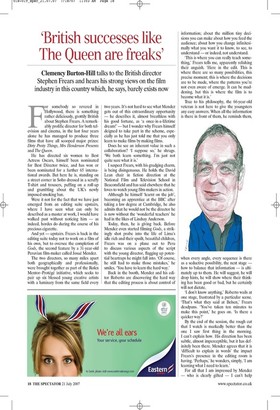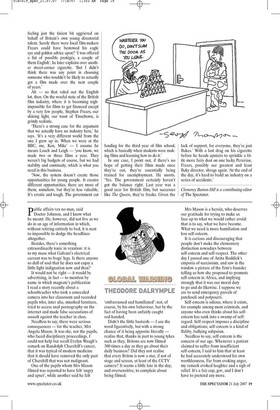'British successes like The Queen are freaks'
Clemency Burton-Hill talks to the British director Stephen Frears and hears his strong views on the film industry in this country which, he says, barely exists now For somebody so revered in Hollywood, there is something rather deliciously, grottily British about Stephen Frears. A remarkably prolific director for both television and cinema, in the last four years alone he has managed to produce three films that have all scooped major prizes: Dirty Pretty Things, Mrs Henderson Presents and The Queen.
He has directed six women to Best Actress Oscars, himself been nominated for Best Director twice, and has won or been nominated for a further 65 international awards. But here he is, standing on a street corner in Soho dressed in a scruffy T-shirt and trousers, puffing on a roll-up and grumbling about the UK's newly imposed smoking ban.
Were it not for the fact that we have just emerged from an editing suite upstairs, where I have seen what can only be described as a master at work, I would have walked past without noticing him — as indeed, hordes do during the course of his precious cigarette.
And yet — upstairs. Frears is back in the editing suite today not to work on a film of his own, but to oversee the completion of Gods, the second feature by a 31-year-old Peruvian film-maker called Josue Mendez.
The two directors, so many miles apart both geographically and professionally, were brought together as part of the Rolex Mentor–Protégé initiative, which seeks to pair up six blessed young creative artists with a luminary from the same field every two years. It's not hard to see what Mendez gets out of this extraordinary opportunity — he describes it, almost breathless with his good fortune, as 'a once-in-a-lifetime dream!' — but I wonder why Frears himself deigned to take part in the scheme, especially as he has just told me that you only learn to make films by making films.
Does he see an inherent value in such a collaboration? 'I suppose so,' he shrugs. 'We both learn something. I'm just not quite sure what it is.'
I suspect Frears, with his grudging charm, is being disingenuous. He holds the David Lean chair in fiction direction at the National Film and Television School in Beaconsfield and has said elsewhere that he loves to watch young film-makers in action.
Although he himself 'learnt on the job', becoming an apprentice at the BBC after taking a law degree at Cambridge, he also admits that he would not be the director he is now without the 'wonderful teachers' he had in the likes of Lindsay Anderson.
Today, then, he is giving back. Before Mendez even started filming Gods, a strikingly shot probe into the life of Lima's idle rich and their spoilt, beautiful children, Frears was on a plane out to Peru to discuss various aspects of the script with the young director, flagging up potential beartraps he might fall into. 'Of course, he still had to make those mistakes,' he smiles. 'You have to learn the hard way.'
Back in the booth, Mendez and his editor Roberto are discovering the hard way that the editing process is about control of information; about the million tiny decisions you can make about how you feed the audience; about how you change infinitesimally what you want it to know, to see, to understand — or indeed, not understand.
'This is where you can really teach something,' Frears tells me, apparently relishing their anguish. 'Here in the edit. This is where there are so many possibilities, this precise moment; this is where the decisions are to be made, where the patterns you're not even aware of emerge. It can be maddening, but this is where the film is to become what it is.'
True to his philosophy, the 66-year-old veteran is not here to give the youngsters any easy answers. When all the information is there in front of them, he reminds them, when every angle, every sequence is there as a seductive possibility, the next stage — how to balance that information — is ultimately up to them. He will suggest, he will drop hints, he will show where their thinking has been good or bad, but he certainly will not dictate.
'I don't know anything,' Roberto wails at one stage, frustrated by a particular scene. 'That's what they said at Belsen,' Frears deadpans. 'You've taken ten minutes to make this point,' he goes on. 'Is there a quicker way?'
By the end of the session, the rough cut that I watch is markedly better than the one I saw first thing in the morning. I can't explain how. His direction has been subtle, almost imperceptible, but it has definitely been there. Mendez agrees that it is 'difficult to explain in words' the impact Frears's presence in the editing room is having. 'Perhaps,' he wonders, simply, 'I am learning what I need to learn.'
For all that I am impressed by Mendez — who is clearly gifted — I can't help feeling just the tiniest bit aggrieved on behalf of Britain's own young directorial talent. Surely there were local film-makers Frears could have bestowed his eagle eye and golden advice upon? 'I was offered a list of possible protégés, a couple of them English', he later explains over another street-corner cigarette. 'But I didn't think there was any point in choosing someone who wouldn't be likely to actually get a film made over the next couple of years.'
Ah — so that ruled out the English lot, then. On the woeful state of the British film industry, where it is becoming nighimpossible for films to get financed except by a very few people, Stephen Frears, our shining light, our toast of Tinseltown, is grimly realistic.
'There's a strong case for the argument that we actually have no industry here,' he says. 'It's a very different world from the one I grew up in. When we were at the BBC, me, Ken, Mike' — I assume he means Loach and Leigh — 'you know, we made two or three films a year. They weren't big budgets of course, but we had stability and continuity, which is what you need in this business.
'Now, the system doesn't create those opportunities for young people. It creates different opportunities, there are more of them, somehow, but they're less valuable. It's erratic and tough. The government cut funding for the third year of film school, which is basically when students were making films and learning how to do it.'
In any case, I point out, if there's no hope of getting their films made once they're out, they're essentially being trained for unemployment. He snorts. 'Yes. The government certainly haven't got the balance right. Last year was a good year for British film, but successes like The Queen, they're freaks. Given the lack of support, for everyone, they're just flukes.' With a last drag on his cigarette before he heads upstairs to sprinkle a little more fairy dust on one lucky Peruvian, Frears, possibly our greatest and least fluky director, shrugs again. 'At the end of the day, it's hard to build an industry on a series of accidents.'
Clemency Burton-Hill is a contributing editor of The Spectator.













































 Previous page
Previous page